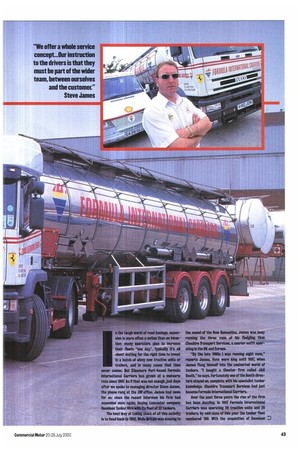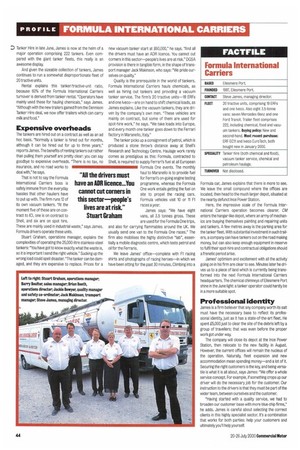sion is more often a notion than an Inten
Page 45

Page 46

If you've noticed an error in this article please click here to report it so we can fix it.
1 n the tough world of road haulage, expan
tion: many operators plan to increase their fleets "one day". Typically it's all about waiting for the right time to invest In a batch of shiny new tractive units or trailers, and In many cases that time never comes. But Ellesmere Port-based Formula International Carriers has grown at a meteoric rate since 1991 As if that was riot enough, just days after we spoke to managing director Steve James, the phone rang at the CM office. James had news for us: since the recent interview his firm had expanded once again, buying Lancaster company Dennison Tanker Hire with its fleet of 32 tankers.
The best way of taking stock of all this activity is to head hack to 1982. While Britain was dancing to the sound of the New Romantics, James was busy running the three vans of his fledgling firm Cheshire Transport Services, a courier outfit *perat ing in the UK and Europa.
"By tile late 19110s i was running eight vans," reports James. Vans were king until 1997, when James flung himself Into the uncharted world of tankers. "I bought a Chester firm called JAM Booth," he says. Fortunately one of the Booth dime-: tors stayed on, complete with his specialist tanker knowledge. Cheshire Transport Services had just become Formula International Carriers.
Over the past three years the rise of the firm has been dazzling. In 1997 Formula International Carriers was operating 20 tractive units and 20 trailers; by mid-June of this year the tanker fleet numbered 190, With the acquisition of Dennison Tanker Flire in late June, James is now at the helm of a major operation comprising 222 tankers. Even compared with the giant tanker fleets, this really is an awesome display, And given the sizeable collection of tankers, James continues to run a somewhat disproportionate fleet of 20 tractive units.
Rental explains this tanker/tractive-unit ratio, because 60% of the Formula International Carriers turnover is derived from tanker rental. "Operators have mainly used these for hauling chemicals," says James, "Although with the new trailers gained from the Dennison Tanker Hire deal, we now offer trailers which can carry milk and food."
Expensive overheads
The tankers are hired out on a contract as well as an ad hoc basis. "Normally a tanker is hired out for months, although it can be hired out for up to three years," reports James. The benefits of renting tankers out rather than pulling them yourself are pretty clear: you can say goodbye to expensive overheads. "There is no tax, no insurance, and no road works to deal with," he says.
That is not to say the Formula International Carriers boss is safely immune from the everyday hassles that other hauliers have to put up MM. The firm runs 12 of its own vacuum tankers. "At the moment five of these are on contract to ICI, one is on contract to Shell, and six are on spot hire. These are mainly used in industrial waste," says James. Formula drivers operate these units.
Stuart Graham, operations manager, explains the complexities of operating the 25,000-litre stainless-steel tankers: "You have got to know exactly what the waste is, so it is important I send the right vehicle." Sucking up the wrong load could spell disaster. "The tanker can be damaged, and they are expensive to replace. Prices for a new vacuum tanker start at £60,000," he says. "And all the drivers must have an ADA licence. You cannot cut corner's in this sector—people's lives are at risk." DGSA provision is there in tangible form, in the shape of transport manager Jack Makinson, who says: "We pride ourselves on quality."
Quality is the prerequisite in the world of tankers. Formula International Carriers hauls chemicals, as well as hiring out tankers and providing a vacuum tanker service. The firm's 20 tractive units-19 ERFs and one Iveco—are on hand to shift chemical loads, as James explains. Like the vacuum tankers, they are driven by the company's own men. "These vehicles are mainly on contract, but some of them are used for spot-hire work," he says. "We take loads into Europe, and every month one tanker goes down to the Ferrari factory in Maranello, Italy."
The tanker picks up a consignment of petrol, which is produced a stone throw's distance away at Shell's Research and Technology Centre. Haulage work rarely comes as prestigious as this: Formula, contracted to Shell, is required to supply Ferrari's fuel at all European Formula One events. The monthly haul to Maranello is to provide fuel for Ferrari's on-going engine testing programme, whereas the Formula One work entails getting the fuel on site to propel the racing cars. Formula vehicles visit 10 or 11 Fl races a year.
James says: We have eight vans, all 3.5 tonnes gross. These are used for the Formula One trips, and also for carrying flarnmables around the UK, We usually send one van to the Formula One races." The firm also mobilises the highly distinctive "lab", essentially a mobile diagnostic centre, which tests petrol and oil for the Ferraris.
We leave James' office—complete with Fl racing shirts and photographs of racing heroes—in which we have been sitting for the past 30 minutes. Climbing into a Formula car, James explains that there is more to see. We leave the small compound where the offices are located, then head to the much larger depot, situated at the nearby defunct Ince Power Station.
Here, the impressive scale of the Formula International Carriers operation becomes clearer. CM enters the hangar-like depot, where an army of mechanics are busying themselves painting and repairing units and tankers. A few metres away is the parking area for the tanker fleet With substantial investment in such trailers, a company can have tankers out on the road making money, but can also keep enough equipment in reserve to fulfil their spot-hire and contractual obligations should a frenetic period arise.
James' optimism and excitement with all the activity going on in his firm are clear to see. Minutes later he drives us to a piece of land which is currently being transformed into the next Formula International Carriers headquarters. The chemical chimneys of Ellesmere Port shine in the June light: a tanker operator could hardly be in a more suitable spot.
Professional identity
James is a firm believer that any company worth its salt must have the necessary base to reflect its professional identity, just as it has a state-of-the-art fleet. He spent £5,000 just to clear the site of the debris left by a group of travellers; that was even before the proper work got under way.
The company will close its depot at the Ince Power Station, then relocate to the new facility in August. However, the current offices will remain the nucleus of the operation. Naturally, fleet expansion and new accommodation mean spending money—and a lot of it. Securing the right customers is the key, and being versatile is what it is all about, says James: "We offer a whole service concept For example, if something crops up our driver will do the necessary job for the customer. Our instruction to the drivers is that they must be part of the wider team, between ourselves and the customer.
"Having started with a quality service, we had to broaden our customer base with more blue chip firms," he adds. James is careful about selecting the correct clients in this highly specialist sector. Its a combination that works for both parties: help your customers and ultimately you'll help yourself.




















































































































